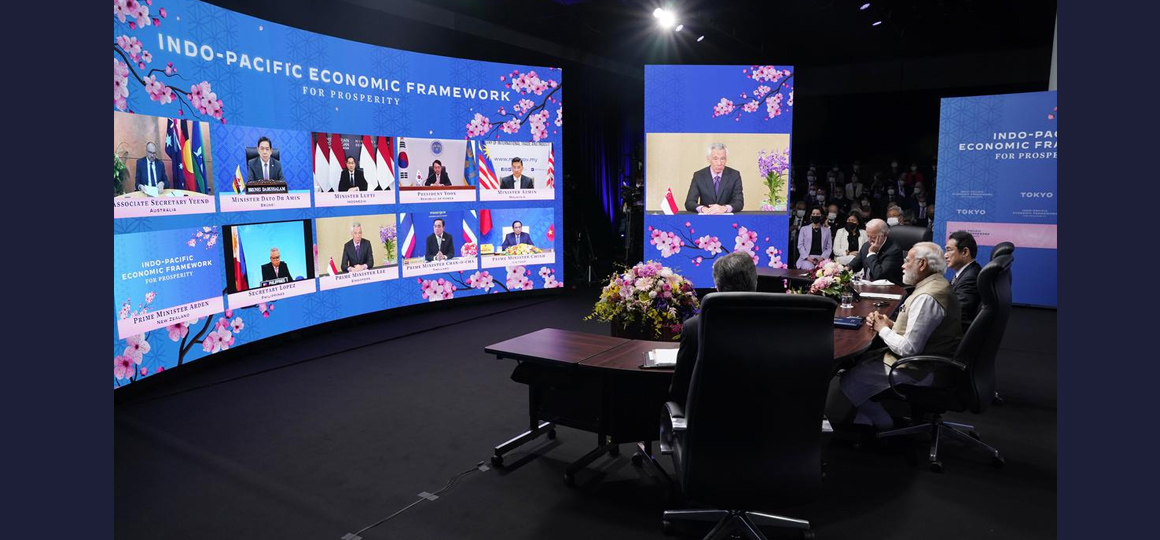U.S. officials made it clear that the IPEF would not be a “free trade agreement”, nor are countries expected to discuss reducing tariffs or increasing market access.
India signalled its readiness to join a new economic initiative led by the United States for the region, as Prime Minister Narendra Modi joined U.S. President Joe Biden, Japanese Prime Minister Fumio Kishida and leaders of 10 countries, who joined virtually, for the launch of the Indo-Pacific Economic Framework for Prosperity (IPEF) in Tokyo on May 23. The negotiations for the IPEF, which will begin on May 24, are expected to center around four main pillars, including trade, supply chain resiliency, clean energy and decarbonisation, and taxes and anti-corruption measures. The grouping, which includes seven out of 10 members of the Association of South East Asian Nations (ASEAN), all four Quad countries, and New Zealand, represents about 40% of global GDP.
“India will work together with [other IPEF countries] to build an inclusive and flexible Indo-Pacific Economic Framework,” Mr. Modi said at the launch of the new initiative, that comes three years after India walked out of the 15-nation RCEP (Regional Comprehensive Economic Partnership).
“I believe that resilient supply chains must be based on three-pillar foundation of trust, transparency and timeliness and I am sure that this framework will make these pillars strong and lead to prosperity, peace and prosperity in the Indo-Pacific region,” Mr. Modi added. ALSO READ

PM Modi to attend U.S. Indo-Pacific economic plan launch in Tokyo
U.S. officials made it clear that the IPEF would not be a “free trade agreement”, nor are countries expected to discuss reducing tariffs or increasing market access. In that sense, the IPEF would not seek to replace the 11-nation CPTPP (Trans-Pacific Partnership) that the U.S. quit in 2017, or the RCEP, which China, and all of the other IPEF countries (minus the U.S.) are a part of. Three ASEAN countries considered closer to China — Myanmar, Cambodia and Laos — are not members of the IPEF, however.
Briefing the media, U.S. Commerce Secretary Gina Raimondo said that the U.S. would seek to attract businesses investing in China away towards IPEF. “I would say, especially as businesses are beginning to increasingly look for alternatives to China, the countries in the Indo-Pacific Framework will be more reliable partners for U.S. businesses.”
U.S. Trade Representative (USTR) Katherine Tai also said that the IPEF would be different from the original Trans-Pacific partnership as the U.S. was “unable to deliver on the plan”, indicating hurdles in the U.S. Congress, where any trade concessions are seen in an increasingly unfavourable light.
U.S. National Security Advisor Jake Sullivan also said that the IPEF was intended to boost U.S. manufacturing. “The Indo-Pacific Economic Framework, or IPEF, is part of President Biden’s commitment to putting American families and workers at the centre of our economic and foreign policy, while strengthening our ties with allies and partners for the purpose of increasing shared prosperity,” Mr. Sullivan told journalists.
Details of the framework on the four pillars are still to be fleshed out, and government officials said India will keenly watch the progress in negotiations on the IPEF. One of the IPEF’s roles in the Indo-Pacific, said documents and a fact sheet released after the launch, will be to set and follow standards for the digital economy and cross-border data flows and data localisation, areas where India has had some strong differences with the U.S. and allies, especially after it tabled a data protection Bill that makes data localisation mandatory.
The framework also seeks to counter inflation through more resilient supply chains, promoting more commitments from every member country on clean energy and decarbonisation, and commitments on a “fair economy” though effective tax regimes that tackle money laundering and bribery and corruption, the documents said.
“With today’s launch, partner countries will begin discussions focusing on strengthening economic cooperation and achieving shared goals,” the Ministry of External Affairs’ statement said, underlining the fact that the IPEF’s contours are still to be formally agreed upon. The IPEF plan follows a U.S. plan for a “Blue Dot Network” to certify infrastructure projects against a set of criteria and standards, that was launched by the U.S., Japan and Australia in 2019.






NO COMMENT